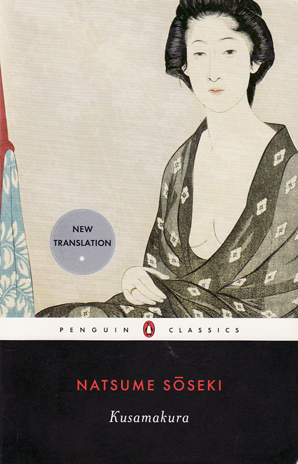The missing corner of the three cornered world is common sense.
This absolutely exquisite novel from 1906 by one of the most revered of Japansese writers, Natsume Soseki, considers to droll but also profound effect how a slightly hapless artist seeks to engage 'non-emotionally' with the world as he visits a remote mountainous spa or hot springs.
As the protagonist describes this aesthetic using the analogy of the game of Noh; the pleasure that we take from engaging in the game is not from any skill at presenting the raw human feelings of the 'everyday' world but:
"...from clothing feeling 'as it is' in layer upon layer of art, and in a kind of slowed serenity of deportment not to be found in the real world".
That phrase 'slowed serenity of deportment' (instantly becoming one of my favourite ever lines) is a beautiful way of capturing a wholly different disposition towards the world is required in order to be truly able to appreciate its radiance.
One might now think that this is a novel of insufferable self indulgence and endless noodling about the struggles of the artist to capture the ineffable with a cover by Roger Dean. The good news, including for the ineffable, is that it isn't.
It is indeed a serious meditation about the ideal of writing a novel composed entirely in haiku (don't worry, this isn't it) and Soseki was clearly expressing his scepticism about the general movement in Japan to embrace Western modernism and realism. The culmination of the plot, such as it is, reflects precisely that concern.
It is, however, a wonderfully light meditation focused on the bewitching daughter of the spa owner who in my mind now ranks up there with Elizabeth Bennett as the literary character you'd most like to find on Guardian Soulmates. The interaction between artist determined to live non-emotionally and the rather emotional feelings that he clearly has for her is delightful:
"Were one to enumerate all the words, in every language from East and West from classical times until today, that writers have devoted to evaluating the qualities of beautiful women, the list may well rival in length the complete canon of the Buddhist sutras."
Nami is a deeply intriguing character who has suffered a great deal and but is able to discombobulate our protagonist with ease. In effect the central sections of the book play out as a series of engagements between the two of them wonderfully undercut by a sense of playfulness but one that also reflects profound despair, certainly on her part.
This emotional engagement is then refracted by the artist in his attempts to write haiku and his failure to paint.
It is also wonderfully realised in a way that is true to the divergence between what Soseki was seeking to achieve and what a conventional plot would demand, in that nothing actually happens.
But just listen to this passage about the artist's appreciation:
"Imagine that a fault appears in the earth where once stillness has reigned, and the whole begins to move. Aware that movement is contrary to its original nature, it strives to return to its original immobility; yet once unbalanced momentum compels it to continue its motion, so that now we see a form that from sheer despair chooses to flaunt the movement enforced on it. Were such a form to exist, it would serve precisely to describe the woman before me."
The central point of the novel for me is that whilst there is no consolation to be had from the fact that the world is indifferent to us - not in a way that is fickle or tricksy but just in the profound sense that it will go on regardless - our efforts to be brave or do the right thing and our all too frequent experience of suffering need to have something to bring balance. It is the pleasure from art - from painting, from poetry and from drama - that provide that pleasure 'within this anguish'.
So on the rare occasions when the artist is able to achieve the intoxicating appreciation of the thing in itself, the pleasure that is secured for the artist and the observer matters all the more.
And here, by way of a sign off, is the great man himself with a slightly less prominent handlebar moustache than was sometimes the case.
"A world where falling in love requires marrying is a world where novels require reading from beginning to end".
That's the 'non-emotional' way of reading. But you should read this one, non-emotionally or otherwise.
Raise a thimble of sake, one and all.


Comments
Post a Comment